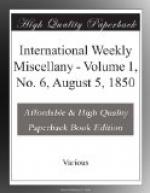The conversation now turned entirely on Hallberg. Edward related the particulars of his death. Every one present had something to say in his praise; and although this sudden allusion to his dearest friend had agitated Edward in no slight degree, yet it was a consolation to him to listen to the tribute these worthy people paid to the memory of Ferdinand, and to see how genuine was their regret at the tidings of his early death. The time passed swiftly away in conversation of much interest, and the whole company were surprised to hear ten o’clock strike, an unusually late hour for this quiet, regular family. The chaplain read prayers, in which Edward devoutly joined, and then he kissed the matron’s hand, and felt almost as if he were in his father’s house. The Baron offered to show his guest to his room, and the servant preceded them with lights. The way led past the staircase, and then on one side into a long gallery, which communicated with another wing of the castle.
The high-vaulted ceilings, the curious carving on the ponderous doorways, the pointed gothic windows, through many broken panes of which a sharp nightwind whistled, proved to Edward that he was in the old part of the castle, and that the famous chamber could not be far off.
“Would it be possible for me to be quartered there,” he began, rather timidly; “I should like it of all things.”
“Really!” inquired the Baron, rather surprised; “have not our ghost stories alarmed you?”
“On the contrary,” was the reply, “they have excited the most earnest wish—”
“Then, if that be the case,” said the Baron, “we will return. The room was already prepared for you, being the most comfortable and the best in the whole wing; only I fancied, after our conversation—”
“Oh, certainly not,” exclaimed Edward; “I could only long for such dreams.”
During this discourse they had arrived at the door of the famous room. They went in. They found themselves in a lofty and spacious apartment, so large that the two candles which the servant carried only shed a glimmering twilight over it, which did not penetrate to the furthest corner. A high-canopied bed, hung with costly but old-fashioned damask, of dark green, in which were swelling pillows of snowy whiteness, tied with green bows, and a silk coverlet of the same color, looked very inviting to the tired traveler. Sofa and chairs of faded needlework, a carved oak commode and table, a looking-glass in heavy framework, a prie-dieu and crucifix above it, constituted the furniture of the room, where, above all things, cleanliness and comfort preponderated, while a good deal of silver plate was spread out on the toilet-table.
Edward looked round. “A beautiful room!” he said. “Answer me one question, Baron, if you please. Did he ever sleep here?”
“Certainly,” replied Friedenberg; “it was his usual room when he was here, and he had a most curious dream in that bed, which, as he assured us, made a great impression on him.”




